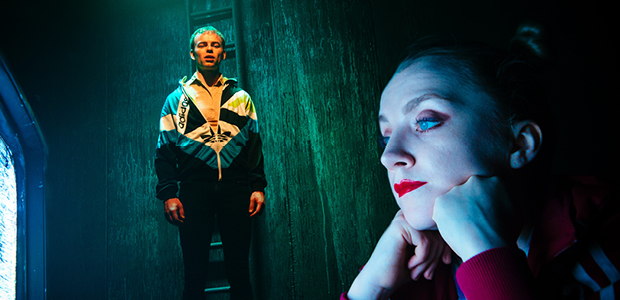‘I‘m looking for works that really jump off the page. The kind that grab me in a headlock’ says director John Haidar of Disco Pigs
‘The first time I read it, it punched me in the face,’ says John Haidar, casually.
The unassuming, contemplative director is sitting with me in the bar, ahead of an evening performance of Disco Pigs, early in the anniversary production’s run at Trafalgar Studio 2.
‘When I read scripts, I’m looking for works that really jump off the page. The kind that grab me in a headlock and refuse to let me go. I really believe that art, in any medium, needs to tell an urgent truth. It shouldn’t be polite.’
Haidar, who describes himself as a writer’s director, has a particularly strong bond with the plays of Enda Walsh, the Irish playwright much admired for his searing, laid-bare portrayals of human character and relationships. Disco Pigs was Walsh’s debut play at the Edinburgh Fringe in 1997, and rapidly rocketed him into the heady heights of the theatre world.
‘Disco Pigs is an incredible, radical piece of work,’ continues Haidar. ‘It’s as poetically and politically relevant to our society now as it was when Enda penned it – perhaps even more so as it makes us very aware of how little we have changed as a society when it comes to the culture of youth, outlook and opportunity.’
VISCERAL, VITAL STORYTELLING
The compact, two-hander play starring Evanna Lynch (Harry Potter, My Name is Emily) and Colin Campbell (Dublin by Lamplight, Through a Glass Darkly) follows the coming-of-age rollercoaster of a teenage boy and girl, inseparable friends since birth, who go by the nicknames of Pig and Runt. Set in the city of Cork, Ireland, in the mid 90s, the narrative feels as raw and affecting as when the pair first stormed the stage twenty years ago and it can make for uncomfortable viewing – as it should. This is exactly the visceral, vital storytelling that Haidar is on a mission to seek out.
‘The play has a certain complicity with the audience, it enables the actors to forge a relationship quickly. It’s a relatively short play, so as a director you need to find a powerful way to hook the audience in the first few minutes. This play does that itself, from the opening line.’
Haidar’s very physical descriptions of his encounters with certain scripts are reflected in his approach to staging too. It draws in the audience, as much through what is absent as what is offered. Here, he reduces the duo’s world to a bleak shell, an effective representation of the introspective day-to-day into which they inject a desperate energy.
 Colin Campbell and Evanna Lynch
Colin Campbell and Evanna Lynch
THE INTENSITY AND HEDONISM OF 90S NIGHT-TIME CULTURE
And Haidar has woven the whole piece together with a pulsing, emotive soundtrack of The Chemical Brothers, Underworld, Faithless among others, which powerfully conjure the intensity and hedonism of 90s night-time culture, symbolic of the duo’s vision of freedom.
‘The physical, sensory elements of theatre really fascinate me,’ explains Haidar. ‘It’s an area I want to research much further. There is so much more to be explored through sound, smell and sensation. I want the audience to really feel a play, not simply watch it or sit with it.’
When I speak to him he is still very much involved in the daily iterations of the production, but he’s starting to feel comfortable about taking a step back.
‘When you fall in love with a piece of work, you get consumed, so it can be hard to move on. But when you find a cast who care just as much about it, if not more than you do, you know you are placing it into the best hands and can let the actors take ownership of it,’ he smiles, if a little wistfully.
So, in the words of this play’s female protagonist, ‘Where to?’
‘Well, I’ve now read all of Enda’s plays and I can’t get enough of them. So I’m absolutely determined to stage more of them during my career,’ he enthuses. ‘But in the meantime I have much more researching and searching to do. There is a lot out there to explore.’
Interview by Lucy Johnston
